By Claire Bacon, ACN, CNC
Are you old enough to remember the media storm following talk show host Jenny Jones’ traumatic health challenges? In 1992, Jenny Jones announced to the world that her silicone breast implants had caused issues for her health. As a result, thousands of women started making the connection that their declining health might be related to their silicone implants. Jenny Jones soon became a well-known advocate for women’s health.
Later that year, Jones founded the Image Foundation, to provde information to women having similar problems. After six surgeries, Jones finally had her own implants removed. She has also donated significant financial assistance to charities supporting women needing explant surgery, funded a scholarship program, and has campaigned extensively for breast cancer research.
Jenny Jones has done so much philanthropic work to raise awareness for women’s health and other issues. But still, after checking the data, Breast Augmentation continues to be one of the Top 5 cosmetic surgical procedures. Silicone implants were used in 84% and saline implants in 16% of all breast augmentations in 2020. Are most women in the dark about the health risks of breast implants?
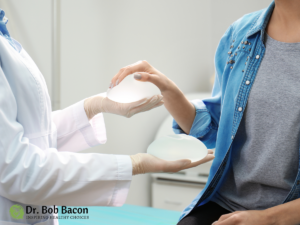
Medical Attention to Breast Implant Illness
Breast implant illness (BII) is a collection of symptoms that can range from joint pain, rashes, hair loss, and headaches to chronic fatigue, anxiety, and brain fog. In addition, we have seen from personal experience in our office that some women develop autoimmune diseases, like Lupus or various connective tissue diseases. BII symptoms can vary and may be long-lasting after the removal of implants.
Most BII symptoms can be related to other body systems. You may not think, could this be my breast implants? I suspect that thousands of women are going around and around trying to address multiple symptoms without considering their inflammation might be all coming from the same source. There are at least 56 symptoms of breast implant illness. The top symptoms include:
- Chronic fatigue
- Joint and muscle pain
- Brain fog
- Hair loss
- Insomnia
- Symptoms of thyroid dysfunction
- Anxiety
- Skin rashes
- Depression
- Dry eyes
- GI issues
- Persistent viral infections
- Headaches
- Ear ringing
Some of the above symptoms could be due to localized tissue damage, whereas others could result from a systemic dysregulated immune system. Some studies even point to disturbances in the internal microbiome, with biofilms and overgrowth of bacteria and pathogenic yeast.

Informed Consent for Breast Implants
Informed consent is top priority when considering a medical procedure. This happens when a healthcare provider educates a patient about the risks, benefits, and alternatives of a drug, procedure, or intervention. Informed consent is a legal obligation of medical practitioners in the US (however, we haven’t seen much of that over the last 4 years). The patient must be able to make a fully informed and voluntary decision whether the desired benefits are worth the risks, without any pressure, coercion, or misleading statements.
Like any surgery, breast implant surgeries carry risks. The most common risks of surgery are implant leakage/rupture, incorrect implant position, changes in nipple sensation, infection, bleeding, and accumulation of fluid.
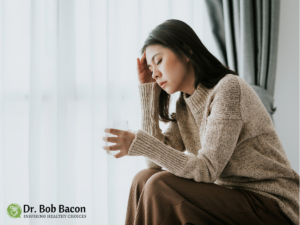
Testimonials
At this time, we’re seeing many women come forward and speak openly about their own personal experiences…
“When I had my implants put in, I was told about and given papers that discussed common possible issues such as capsular contracture, infection, pain, malposition of the implant, etc. I was never informed about breast implant illness or any significant side effects regarding autoimmune problems or other health issues associated with having breast implants. I was also given a pamphlet made by the breast implant manufacturer, which only highlighted the positives and safety of their breast implants.”
– Krista Tagaras, Personal Trainer and BII Advocate
“The straw that broke the camel’s back was that I started having problems walking. My feet hurt so bad, and I started having hip pain to the point of not being able to sleep well or get out of the bed. I was once an active person, a hunter and fisher that loved the outdoors, go hiking and do sports. But by then I didn’t feel like doing anything.”
A 49 year old woman from NW Georgia
“Four years after getting my implants, my symptoms became so severe, I could no longer ignore them. I became extremely ill. I developed food allergies. I could not digest food. I experienced debilitating pain and fatigue. I developed migraines daily. I suffered from dizzy spells. You name it, I had it. I had over 32 symptoms, and 10 diagnosed auto-immune illnesses. I felt as if my whole body was falling apart!”
Terri Diaz
Luckily, BII awareness is growing, and more women are confronting their doctors with demands for post-surgical help. Even so, and even with growing concern and awareness coming from women speaking up, BII is still not a recognized medical diagnosis. We have a long way to go, but more physicians are starting to understand that breast implant illness is real and serious.
Featured Testimonial: Niki’s Story
Figuring Out the Breast Implant Problem and the Solution
Many women are told that saline implants are safe because they’re just filled with salt and water. Sadly, women are usually not informed that saline implants can be just as dangerous as silicone. Saline implants are not hermetically sealed (not airtight), and their filling valves are not 100% secure. Because of this, bodily fluids, yeast, mold, and bacteria can possibly enter the implant, which can lead to infection.
If bodily fluids can enter the implant, then the implant’s contents can also enter the body. If implant contents leak into the chest, the foreign substances can have a systemic impact on the immune system and a multitude of inflammatory processes.
Many people don’t realize that breast implants (both silicone and saline) have a warranty of only ten years. The longer implants remain in the body, the greater the risk of complications.

Breast Implant Illness Studies
Recently, a large multicentered, cohort study was conducted, involving 99,993 women with breast implants. This has been the most extensive study of breast implant outcomes to date. In this study, 56% of participants had silicone implants. The results showed that silicone implants were associated with higher rates of:
- Sjögren’s syndrome,
- stillbirth,
- melanoma,
- scleroderma,
- rheumatoid arthritis, and
- capsular contracture.
In addition, saline implants were more likely to rupture in the short term.
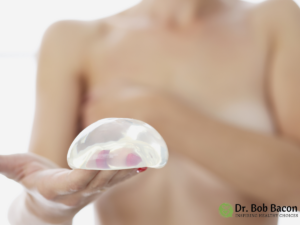
In another study of women with silicone breast implants, leakage resulted in:
- fibromyalgia,
- Hashimoto’s Disease,
- polymyositis,
- mixed connective tissue disease, and
- pulmonary fibrosis.
Explant Treatment
Explant surgery is the primary “treatment” for breast implant illness. (Remove the implants and source of the problem – that makes sense!) During explant surgery, your doctor might also find silicone leaks in the chest cavity. And will likely remove scar tissue that often forms around the implants.
Implant leaks, scar tissue, and other painful symptoms do not always occur. However, if this sounds familiar, you may need to have your implants removed. We have seen some women try to reduce symptoms without going through explant surgery. This doesn’t work very well and can be expensive. Don’t let too much time pass working on inflammation without seriously considering an explant.
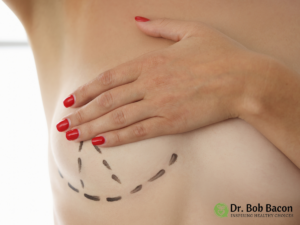
Nutrition & Supplements to Help BII Symptoms
Adopting an anti-inflammatory diet will nourish your body and help optimize your hormones. Whenever possible, you want to choose:
- organic, colorful vegetables,
- grass-fed or pasture-raised meat,
- wild-caught fatty fish,
- Omega-3 rich foods like walnuts, chia seeds, flax seeds, and cold water fish,
- Ginger or Turmeric tea.
Healthy fats, nutrient dense foods, and fiber rich plants can support your hormones and nourish your gut health. But often, a great diet is not enough. Some of our best anti-inflammatory supplements include:
- Turmeric Forte – Curcumin (a compound found in turmeric) may help calm inflammation without the side effects of conventional anti-inflammatory drugs. Keep in mind to include a healthy fat and black pepper to increase its absorption.
- Cod Liver Oil – The proper omega-3 to omega-6 ratio may help quiet inflammation, and omega-3 fatty acids are necessary for many body processes anyway. We have to get our omega-3s through diet or supplementation.
- Adaptogenic Herbs like Rhodiola-Ginseng, Eleuthero, and Ashwagandha Complex – The adrenal glands produce cortisol in response to inflammation. This is a crucial hormone in controlling inflammation and is important in overall hormone balance.
- The immunoglobulins in Immuno-gG-SBI help to remove inflammatory compounds from the gut environment and reduce inflammation.
- NAC (N-Acetylcysteine) – NAC can reduce oxidative stress and inflammation, enhance immune function, and promote detoxification.
- Healthy levels of Vitamin A and Vitamin D are essential for immune system function and opposing inflammation. In certain situations, levels need to be higher than for the average person. Available in office.
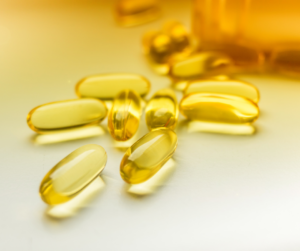
Will a careful diet and supplementation resolve your breast implant illness? No. But these tools can help manage your symptoms while you’re waiting for or recovering from explant surgery.
Final Thoughts
With so many possible serious issues, it’s time we rethink breast implant surgery. What is beauty, after all? To me, it’s radiant health with glowing energy. It’s the ability to pursue everything you want in life – whether it’s being productive at work, traveling the world, or raising children at home. In short, beauty is that special look that emanates from a truly happy and healthy person.
Who do you know who needs to rethink her implants?



